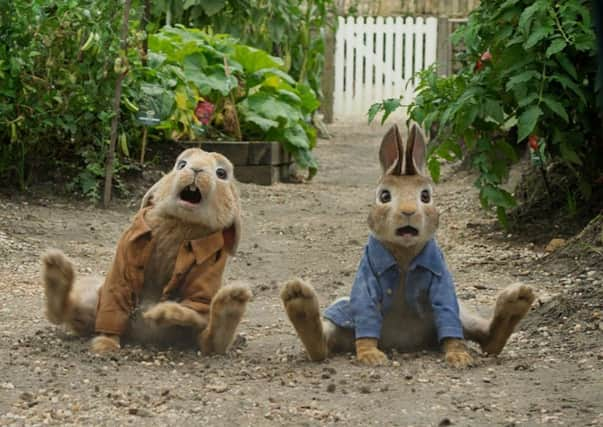Film reviews: Peter Rabbit | Mary Magdalene | Annihilation | The Square


Peter Rabbit (PG) *
Mary Magdalene (PG) **
Annihilation (no cert) ***
The Square (15) ***
Food allergy sufferers have nothing to worry about in the new live-action Peter Rabbit movie. The set-piece that seemed to cause such offence when the film was released in the US last month – it featured the denim-jacketed bunny throwing blackberries at a man he knew was allergic to them – has been excised, replaced with a winking, self-referential gag acknowledging the ridiculousness of – ahem – allergy-gate. Sadly, it would take more than retrofitting one misjudged joke to salvage this dreadful adaptation of Beatrix Potter’s The Tale of Peter Rabbit, which doesn’t so much capture the spirit of the beloved children’s picture book as take the basic idea hostage, sentence it to death and jump up and down on its grave.
Co-writer/director Will Gluck (who made the terrible Annie remake a few years back) sets the groaning tone early on with a musical-inspired joke ripped-off from Shrek, then proceeds to up the irritation factor considerably by turning Peter (voiced by a none-more-irritating James Corden) into a petulant, irredeemable little ratbag whose behaviour tips over from the mischievous disobedience of Potter’s Peter into sadistic, sociopathic narcissism. The target of his ire is Domhnall Gleeson’s fastidious toyshop employee, Thomas, who has inherited a delightful countryside mansion in the Lake District from his recently deceased uncle (played by Sam Neill). Intent on selling the place quickly, he resolves to bring order to his uncle’s garden, which ruins Peter’s dream of finally having free rein of old Mr McGregor’s vegetable patch.
Advertisement
Hide AdAs plots for children’s movies go, that’s simple enough to be turned into something suitably irreverent, but it all gets very mean-spirited, particularly as Thomas also falls for next-door-neighbour Bea (Rose Byrne) – an aspiring artist whose illustrations of Peter and Co. resemble Potter’s own artwork. In addition to Gleason, Byrne and Neill, the likes of Margot Robbie and Daisy Ridley (both doing fairly anonymous voice work) round out the cast, their collective A-list credentials suggesting that all involved signed on in the hopes this would be another Paddington. It’s not. As Peter participates in car chases, wires up electrocution devices, and then starts messing around with explosives, this seems less like a family-friendly cinematic treat for Easter than a solid argument for myxomatosis.
The imminent arrival of Easter also brings Mary Magdalene, the latest ultra-serious Hollywood-backed Biblical epic attempting to be a credible film for believers and non-believers alike. Starring Rooney Mara as Mary and Joaquin Phoenix as Jesus, it does make an admirable attempt to put a feminist spin on the gospels by moving its eponymous protagonist to the centre of the story and reclaiming her reputation from centuries of patriarchal damnation. Alas, director Garth Davis (Lion) and screenwriters Helen Edmundson and Philippa Goslett rather fail to make her anything more than a passive witness to Christ’s miracles. Mara brings her customary intensity to the role, but she doesn’t have much to do beyond gazing beatifically at the ever-enigmatic Phoenix.
Marking Alex Garland’s follow-up to his acclaimed Ex Machina, Annihilation also marks the latest attempt by Netflix to disrupt traditional distribution methods thanks to original backers Paramount choosing to debut the mid-budget sci-fi effort on the streaming service rather than in cinemas.
That’s something that worked for Bong Joon-ho’s excellent Okja, and rather less well for The Cloverfield Paradox. Happily Garland’s film is closer to Okja in the quality stakes, even if his determination to make a big, complex, sci-fi thriller has resulted in a film that never quite engages in the way that it should.
Natalie Portman takes the lead as Lena, a military-trained biologist recruited to investigate the “shimmer” – an alien-controlled area of national parkland that has caused the death of everyone who’s entered it, including, possibly, her soldier husband (Oscar Isaac).
What follows mixes body horror with trippy mediations on the nature of humanity, though the less you know going in, the better. Even so, it’s familiar territory in some respects and it actively courts comparisons to Alien as well as Tarkovsky classics such as Stalker and Solaris. But Garland has also been mining this territory for much of his film career – in his scripts for 28 Days Later, Sunshine and Never Let Me Go – and he distils those interests here by subverting all the usual tropes in order to create something that – somewhat appropriately given plot developments within the film –
Advertisement
Hide Admay feel familiar but in ways that are intentionally unsettling.
Winner of the Palm D’Or at last year’s Cannes Film Festival, Ruben Ostlund’s modern art satire The Square picks at some pretty low-hanging fruit, but there’s fun to be had in the way it interrogates the moral commitment of artists and institutions intent on making great social claims for their work. The title itself refers to a new work intended as “a sanctuary of trust and understanding” – values from which Stockholm museum curator Christian (Claes Bang – a dead-ringer for Pierce Brosnan) finds himself straying as he enacts an ill-judged plan to retrieve his stolen mobile phone. The plan itself has
Advertisement
Hide Adthe sort of sinister undertow one might expect to find in a Michael Haneke film, but the absurdity
that follows is mirrored by the absurdity of the world he’s already an active participant in. Consequently any larger points are obscured by its far-from-unique meditations on gender, masculinity and western privilege. ■